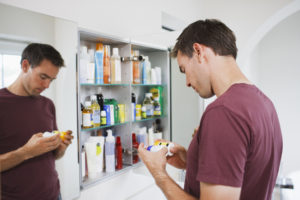
It could be for any number of reasons. Perhaps you frequently suffer bouts of back or joint pain. Maybe it’s tension headaches. It’s also possible that you have some high strength painkillers, like opioids, leftover from previous prescriptions.
Or maybe you have none of that. Maybe your cabinet is full of nutritional and herbal supplements.
You’re not alone in thinking this is completely normal. After all, these are available in stores everywhere, on your television set, and are regularly recommended by doctors. But that doesn’t mean they can’t get risky very fast.
Liver health is something that’s overlooked in everyday life. But if you’re regularly taking pills and powders for this, that, and the next thing, you could slowly be putting your liver health at risk.
That’s why finding alternative and lifestyle-based approaches to health is so important. If you’re exercising, eating a nutritious diet, and maintaining a healthy weight, it severely reduces the need for medication. The less you find yourself at the medicine cabinet, the better it is for your liver.
Drug-Induced Liver Injury (DILI) occurs when drugs, medications, nutritional supplements, or herbs cause direct damage to the liver. In many cases, there are no symptoms, and damage can go unnoticed until it is severe.
If you’re only taking a few items and following the directions on the bottle, you should be okay. However, if you’re taking megadoses, exceeding recommended doses, or taking multiple products, you could be putting a beating on one of the essential organs in your body.
It’s important to point out that liver damage can be caused by natural products too. Herbal medicines, vitamin supplements, and other “health products” don’t necessarily get a pass. Toxic liver disease from herbal supplements is entirely possible.
Watch for products containing:
- Aloe vera
- Black cohosh
- Cascara
- Chaparral
- Ephedra
- Kava
Too much vitamin A, as well as high doses of niacin, can also lead to liver damage. Excess intake of niacin from energy drinks is associated with acute hepatitis.
To avoid liver injury, take vitamins in their recommended amounts, and try to rely heavily on your daily food choices to deliver the nutrition you need. The right food choices might be the best way to protect your liver and reduce the risk of liver disease.